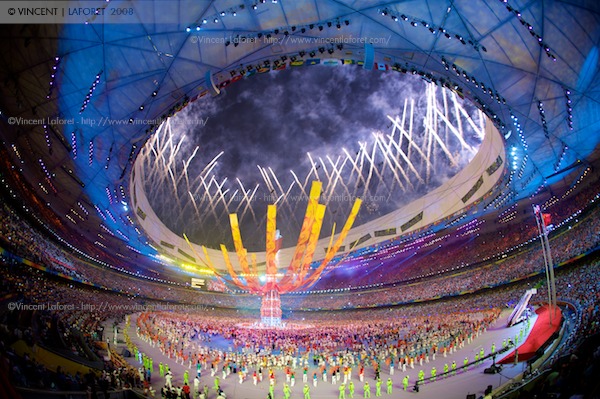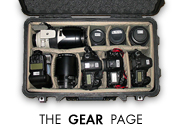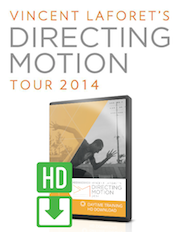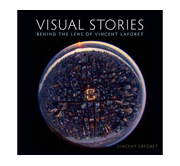Farewell Beijing – it’s been a “Dream Job” to cover these Olympics
By the time many of your are reading this post, I will be on my way to the airport to catch my flight back to New York City. The Beijing Olympics will have concluded and thousands of others will be making their way home—some with gold medals, some with memorable images and stories, others with bruised egos and many with goals of practicing for the next four years in order to shave an extra few hundredths of a second off their performances in time for the London games in 2012. I for one couldn’t be happier. This has been the best Olympics I’ve experienced, and while the host country has played a good part in this, other factors have been much more instrumental in making this a “great success” as Borat would say.
First and foremost, Simon Barnett, Newsweek’s director of photography, and the magazine’s decision to have the three of us blog daily has been the deciding factor in making these game more fulfilling for me than ones prior. Becoming part of the blogosphere has proven to be one of the most interesting and rewarding things I’ve done as a journalist. I studied print journalism in college and have worked as a photographer for over 18 years (since the age of 15), but I never really enjoyed writing on deadline, and always found something a bit lacking with simply sending photographs into a publication and hoping the “best one” or frankly at times any of the ones would make it in. There’s nothing more frustrating than missing a picture, or not being able to make one – and having nothing to show for all of your hard work and effort for the day. The blog has given us a new avenue to express ourselves and share things about our days out here—regardless of whether of not we have visual proof of it. It’s been quite cathartic at times (see the “Time for a Little Introspection” blog post) and the feedback from you guys has really had an effect at keeping the wind in all of our sails I’m sure. I know it has for me.
Although I’ve already praised him in a prior post, I would like to thank Barnett at Newsweek again for rolling the dice with this blog and giving it the green light. After all, you’ve got to admit that no one knew exactly what would come of this prior to the games or if it would be a success or a total disaster… by all accounts I think it’s been a success and that everyone has benefited from this in some way. I hope I’m not coming off as a sycophant, but the truth is that having us blog was a pretty visionary thing to ask us to do, at least in my book. Sure, we’re definitely not the first to blog, but blogging was our major focus at these Olympics and it heavily influenced both what and how we shot—in many ways the magazine almost came second. And while some may not yet see the significance of that—or agree with it—to me it’s crystal clear that this kind of two-way exchange with our audience that we need more of in our industry, we need more personal and behind the scenes accounts—and a goal of making unique images that adhere to our own personal visions as opposed to the size of the page or hole we need to fill in a layout is the future of journalism. As you may know, the major magazines have been having a tough time out there; circulation and ad revenue have been dropping consistently in the past two years, and at times people question whether or not magazines and newspapers will be around a decade from now. If these publications continue to experiment and think out of the box as Newsweek did with this blog, I have no doubt that they’ll be around for a very long time. In fact while the dream title for any photographer a few years ago may have been to be a “staff photographer” at some large publication, I can see being a “Photoblogger” as being the next big thing. Maybe we’ll need a different title to separate us from “bloggers”—to clarify that we work by professional journalism standards, as opposed to writing at will and without regards to hard facts. Who knows, only time will tell.
With all of the content available out there my guess is that people are not looking for content that tries to serve the “average” reader—that “reader “being determined by polls and surveys. I think that with the easy access to information and online publications that the Internet is providing us with, people will now go to specific blogs and publications that interest THEM. There is a tremendous amount of room for growth in this area in my opinion and my eyes sure have been opened over these past few weeks. I launched my own blog a week prior to the Olympics and while I am a total newcomer to this blogging world, I’ve already sensed a greater amount of energy and potential in these endeavors than I have with almost any publication in my career. I’ve found it fascinating that professional photographers and hobbyists, as well as people who don’t necessarily have a keen interest in photography, have come to visit and comment on these blogs—and expressed how much they’ve enjoyed them. Although we the photographers have no real idea of how successful this blog has been in terms of hits, etc., if you type “Olympic Photo Blog” this Visions of China is one of the top results to come back from Google—so that must be a good sign.
It’s one thing for us to blog about our everyday lives out here, but it’s also incredibly interesting for us to see the comments, and apparent level of interest coming back our way, often asking for more. Imagine writing about your daily life or job … do you think people would really take interest or care? If there’s anything that I’ve learned in my years as a photojournalist—is that most people would tend to answer “no.” I’ve photographed people doing some of the most interesting jobs, and others doing some of the most banal ones. For the most part, people tend to ask me: “What would you like me to do?” And I’ll always answer: “Do what you would normally do if I weren’t here right now. Pretend I’m not here.” A few get it, but most are confused by this. Some answer that what they do is “incredibly boring;” “who would want to see that?” I tell them that it’s my job to find the beauty in what they do every day and to get to the heart and soul of who they are, sometimes in the matter of seconds, at other times over a few hours or days. To this day, I’ve never met a single person who I found “boring.” If I did, it was because I wasn’t doing my job properly. And that’s a big lesson in photojournalism and in life. The “grass is always greener” and someone else’s life may always seem more interesting than your own… but never be surprised when other people find you life interesting—even if only for the simply fact that your life is different from theirs. What the blog has allowed us to do is to hear back from you—and that’s something you really rarely get when you work for a traditional medium that tends to be a one way interaction and can become a bit monotonous over time… you can only stare at your image in a magazine with you name underneath it for so long. After a while that wears off and you wonder if people are really looking and/or appreciating the images you are making—and more importantly if you are adequately communicating other people’s stories through those photographs. Photography is ultimately not about how good of a photograph you make as a photographer—it is about sharing a moment in time, or of someone else’s life, with others.
Overall, these Olympics have been fantastic. While the Chinese do tend to adhere a bit too literally to the letter of the law (which causes the typical “renegade” individualist photographer to cringe more often than not) they have been incredible hosts. No matter how silly, illogical, or downright asinine some of the rules that have been thrown our way have been, I’ve never come close to losing my temper at a single one of the photo volunteers here—they’re simply doing their jobs, and doing them with incredible kindness and a genuine smile on their face. I can’t tell you how many times someone has rushed to open a door for me, offered to carry one of my bags late at night, asked me how my day was going, or offered me a bottle of water or roster at the start of the game. Never ever have the volunteers and staff been this kind and generous at any Olympics. That is truly the one memory I will come away from here.
I studied Chinese literature, history and culture quite a bit throughout high school and college as I’ve always been fascinated by this part of the world. The cultural revolution that concluded approximately 32 years ago in this country has left it changed for the better in my opinion. While there is still the lingering sign of the socialist way of thinking and bureaucracy, this new generation of people is clearly set on being both a significant force in our global community and economy and in doing so without an outward level of aggression. The people here are incredibly kind—don’t mistake that as a condescending comment in any way. That kindness is founded on a deep mix of devotion to excellent education, hard work, and innovation. China has changed so much since I was first here 7 years ago—and I’m sure it will change even more quickly in the upcoming 7 years. I hope it will continue to change for the best—although what exactly that is, is hard to define for just about any culture.
Despite the difficulty at times that Donald, Mike and I felt with the “pool photographers” having a superior level of access to good shooting positions, I found out that more than 90% of photographs that run in publications worldwide originate from that pool of photographers (given that each pool agency has numerous subscribers, and most smaller publications cannot afford to send a photographer to cover the games). I just hope the IOC continues to see the value in having independent photographers, sports-specific specialist photographers, and individual publications, continuing to contribute to the photographic coverage of these games with their unique visions and perspectives. The IOC has done so historically, and the Olympic mission would suggest that they will continue to do so for the foreseeable future. Regardless of the hurdles we faced, I think that the three “Dream Team” members from Newsweek and countless other non-pool photographers had the chance to produce some pretty memorable images from these games. The image doesn’t always come from the “best” position—at times it does come out of nowhere, from the most random spot… you never know. Being obsessed with having “the” spot can become an unnecessary and dangerous obsession altogether. The one thing that has irked us more than usual is not the fear of not having the “best” spot, but of not having one at all. There were quite a few venues at the Olympics where the non-pool photographers had no view or ability to cover certain key parts of the event—and that’s a problem that needs to be addressed prior to the next Olympic games.
One of the big changes at these Olympics was the practice of allowing us to go through the “mag and bag” right from our hotels and onto the bus straight into the main press center and all subsequent events without ever having to go through security again. This has saved and incredible amount of time and anguish (you never know how long the security lines will be and that makes you hesitate in trying to squeeze in that other event you’re thinking of thinking of rushing to.) I’m a pretty big fan of this and hope it continues in future Olympics. The downside of this, and there always is one of course, is that we’ve lived in a virtual bubble for this entire Olympics. Contact with the culture and people has been much more limited than in previous games, and on a personal note that’s a shame. Of course we’ve had a chance to interact with the Chinese at the games—but they have been living by the “Olympic rule book” and set of codes, which is a strange little universe and culture in it of its own. I’ve also discussed with some other people that there was a little bit of “energy” and “Olympic spirit” missing from the crowds at these games—the level of energy has been much higher at previous games. One colleague opined that this change had more to do with the fact that they sold beer and allowed the spectators to drink it at their seats in Torino… who knows…
As far as this blog, it’s been a pleasure to contribute to it every day, and to read your comments every day—I have read them every morning and I’m sorry I haven’t had time to respond to every one of them. My usual daily routine involves loading the blog comments when I wake up (it takes a long time to load on our hotel Internet connection) and running to breakfast. I then usually catch the bus with one minute to spare and read the comments on the ride to the Main Press Center—and have no internet connection to respond (we can’t do it via e-mail; that would have worked much better…) On the ride back home at night I’m usually working on the next day’s blog—and then the cycle starts all over again! So my apologies for not responding enough to all of your comments—but please don’t think they’ve gone unappreciated.
A big thanks also goes out to Mike, Donald, Al, Melinda, Mark, Leah, Sue, Beth, Peter and the many other friends and colleagues who have helped make our coverage of the Olympic coverage happen.
In the end, I’m happy with many of the photographs and posts I’ve produced, and I’m lucky to have survived yet another Olympic games relatively unscathed. I heard this morning that more than 2,000 members of the media have been prescribed antibiotics at the Main Press Center over these past 16 days. While I’m never quite sure if we were worthy of that “Dream Team” title, I do know that this has been a “dream job.” I’m definitely not taking for granted the incredible opportunity that was given to us: Simon told us to “go out and make great photographs—don’t worry about medals.” And that means that Donald, Mike and I were part of a minuscule group of photographers at these games that were given a chance to go out and have fun. And as a result, this has been the best Olympic games that I’ve ever experienced. I usually leave the games on day 17 completely exhausted, slightly depressed and frustrated with bumps and bruises to my gear, body and ego. At the conclusion of the Athens Olympics, I swore to myself that I would never cover another one. This time I’m leaving full of energy and eager to cover—and hopefully blog from—the next Olympics.

























It has been a real pleasure reading your blog during the Olympics. I believe you have given more insight in what’s happening behind the scenes than any other Olympic news I’ve read. Thank you for that!
Vincent,
merci pour cette couverture des J.O, j’ai vraiment passé de bons moments en regardant votre blog, et je continuerais à suivre votre travail,
à bientôt,
Fred
Vincent,
Thanks for all these great photos and stories.It has been a real pleasure to follow the Olympics this way.
Merci!
Wil
Your Newsweek blog was absolutely incredible — amazing photographs, of course, but all of the behind-the-scenes information (both technical and emotional) made the blog a daily must-read. Thank you so much for sharing. I look forward to hearing more from you here.
Thank you for sharing your experience and your work!! I posted a link on my blog so my readers would see what you created.
Hi Vincent,
Thanks for sharing your journey to Beijing with all of us ! Be the way, how do they say “Not Possible” in Cantonese ? 🙂
I hope you rest a few days !
Jean-Guy (Montréal)
Your blogging was GREAT. As a news photographer myself, your blog was an amazing window into the world of Olympic photographer. Your candor, lessons, humor and great writing were an ispiration to me. I looked forward to reading your blog every day.
Some people define art as work that is not only orignial, but inspires the masses to attempt to reproduce it. Your photography especially your tilt-shift work is that inspiration for me and I’m sure many others.
Thank you for the trip behind the Olympic scenes. You’r blog has been a “must-read” for me and has really given an insight into not only what it’s like being at the olympic games but also how stressfull and demanding it can be to work as a pro photographer. Both dreams of mine.
I think you’r pictures have been excellent and i guess it’s common for photographers to be very demanding on their own work. My favourite pictures was the ones from the 10m diving semi-finals and the tilt-shift pictures of the BMX race, tilt-shift is something you rarely see and it gives a new, quite interesting look.
Thank’s for a great blog, can’t wait for more :).
I cannot let it go without thanking you and your mates for the great coverage of the Olympics. It’s been great to come home every night to enjoy every thought and image you have shared with us all. Your post “Time for a Little Introspection” is the best I have read in some quite time, and I feel it has given my photography much more that any other stuff I’ve read on photography in a long time. thanks a lot.
Vincent
BRAVO!! You, Donald and Mike did a fantastic job with a wonderful idea – great work all around under what are difficult enough circumstances..
Hope you are able to enjoy some time with the family and that we can catch up soon!
mdl
I commend you for a fantastic job. I’ve stuck with your blog since the beginning and it has given me such a beautifully complete vision of the Olympics. I’m still amazed at your ability to find the time to give the entries your all. Thank you thank you thank you.
While I watched some of the big events on TV, I didn’t read a single “mainstream” news article about the Olympics. I only read photoblogs. Your Newsweek blog was easily the best one of the games. You guys did an amazing job of telling us what was really going on there. It also included just the right amount of techie stuff for those of us who wanted to know how you made the shots
The photos you guys came away with are incredible and in most cases are really the best of the games. Other photo editors should make note of this, including those from the “pool” groups. Give the photographers the freedom to do what they need to do, and more importantly, what they are capable of doing, and you’ll get your images and more. You guys proved that…you captured every major “headline” event of the games but also got to experiment a bit and make some different photos…the photos most press didn’t have time or were not allowed to do.
Thank you for sacrificing yourself (and sleep) to share this experiment with us.
Спасибо за ваши фантастические фото !!!
0k2ea2j79kp66n85
Thanks for sharing. It makes everyone wanting to go to Bejing.
Hi Mr. Laforet,
I know you have said that you are working on a feature film and I’m sure that takes up a good bit of your time. However I was wondering if you will be photographing the London 2012 Olympic games?
Vincent Laforet Reply:
March 4th, 2012 at 2:08 pm
I’m trying something… 😉 but involving motion
I just could not depart your website before suggesting that I actually enjoyed the standard info a person provide for your visitors? Is gonna be again ceaselessly to investigate cross-check new posts
Vincent Laforet Reply:
August 5th, 2012 at 2:49 pm
Thank you and you’re welcome!